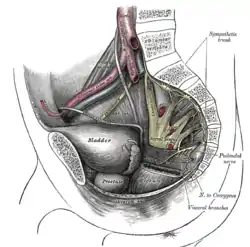| Hard flaccid syndrome | |
|---|---|
| Other names | Hard flaccid |
 | |
| Specialty | Men's health |
| Symptoms | Semi-rigid penis at the flaccid state, flaccid glans at the erect state, pelvic/erectile pain and dysfunction, low libido, penile numbness, frequent/urgent urination |
| Risk factors | Trauma, Antidepressants |
Hard flaccid syndrome (HFS), also known as hard flaccid (HF), is a chronic painful condition characterized by a semi-rigid penis at the flaccid state, a soft glans at the erect state (cold glans syndrome), pelvic pain, low libido, erectile dysfunction, erectile pain, pain on ejaculation, penile sensory changes (numbness or coldness), lower urinary tract symptoms, contraction of the pelvic floor muscles, and psychological distress.[1] Other complaints include rectal and perineal discomfort, cold hands and feet, and a hollow or detached feeling inside the penile shaft. The majority of HFS patients are in their 20s–30s and symptoms significantly affect one's quality of life.[2]
Sufferers typically report the onset of symptoms after trauma due to a mishap during sexual intercourse or tough masturbation, specifically a traumatic injury at the base of the erect penis,[3] possibly affecting the dorsal artery of the penis, the bulbourethral and the pudendal arteries, as well as the pudendal and dorsal nerve of the penis.[4] Penile sensory and textural changes, as well as changes in appearance, are hallmarks of the condition and serve to distinguish HFS from classic chronic pelvic pain syndrome or BPH.[1]
Both biological and psychological influences contribute to the condition by altering the neurovascular supply to the muscles of the pelvic floor and penis. One theory proposes that HFS is a result of an initial stress which triggers an abnormal fight or flight response resulting in increased sympathetic stimulation to the muscles of the pelvis via the perineal branch of the pudendal nerve. In turn, a surge of adrenaline, noradrenaline and cortisol is released from the efferent nerve fibers promoting increased blood flow to the bulbospongiosus, ischiocavernous and levator ani muscles as well as sustained muscle contraction which results in obstructed venous outflow from the penis via compression of the deep dorsal vein and pelvic myoneuropathy secondary to neurogenic inflammation.
Pathophysiology
The pathophysiology of HFS is not well understood, but it is often associated with traumatic events such as vigorous sexual activity, use of vacuum devices, with varying onset times. A key factor is traumatic injury at the base of an erect penis, affecting neurovascular structures supplying the pelvic floor and penile muscles, leading to vascular and sensory changes, partial penile engorgement, and unusual sensations. Emotional distress and sympathetic stimulation trigger prolonged pelvic floor muscle spasms, which further compress these neurovascular structures, leading to penile hypoxia, neuropraxia, sensory alterations, and pelvic muscle impairment. Persistent muscle contractions in various pelvic muscles contribute to penile venous outflow obstruction, causing the semi-hardness state of the flaccid penis. Subsequently, a secondary myoneuropathy develops, leading to erectile and ejaculatory dysfunctions.[3]
Treatment
Treatment may include medications for pain management, pelvic floor physical therapy, biofeedback, and stress reduction techniques. Men experiencing anxiety or depression may benefit from counseling.[5]
See also
References
- 1 2 Hughes K, Parnham A, Lucky M (1 November 2018). "Hard flaccid syndrome". Urology News.
- ↑ Gül M, Serefoglu EC (1 May 2019). "Hard flaccid: Is It a new syndrome?". The Journal of Sexual Medicine. 16 (5). doi:10.1016/j.jsxm.2019.03.194. S2CID 155359721.
- 1 2 Abdessater M, Kanbar A, Akakpo W, Beley S (2020-06-04). "Hard flaccid syndrome: state of current knowledge". Basic and Clinical Andrology. 30 (1): 7. doi:10.1186/s12610-020-00105-5. PMC 7271516. PMID 32518654.
- ↑ Gül M, Towe M, Yafi FA, Serefoglu EC (March 2020). "Hard flaccid syndrome: initial report of four cases". International Journal of Impotence Research. 32 (2): 176–179. doi:10.1038/s41443-019-0133-z. PMID 30890780. S2CID 84184194.
- ↑ "What is hard flaccid syndrome?". International Society for Sexual Medicine. 14 September 2021.